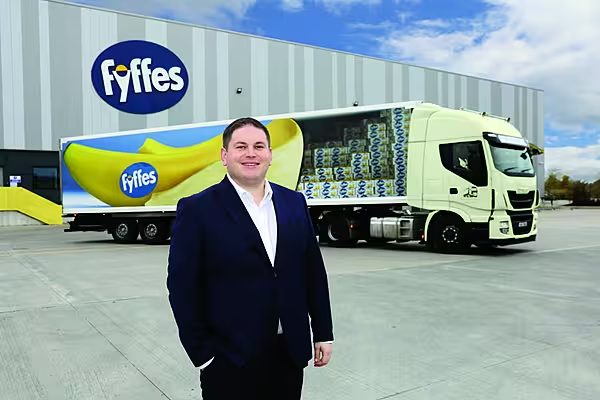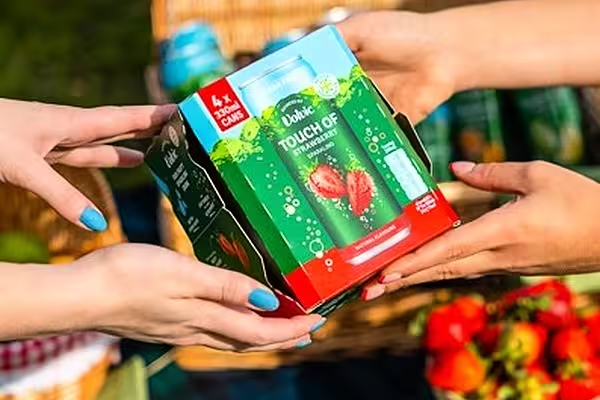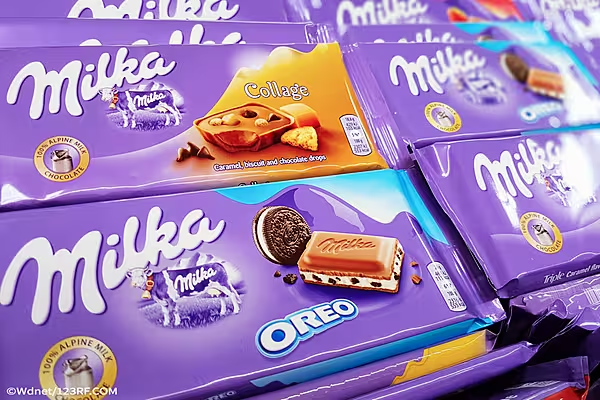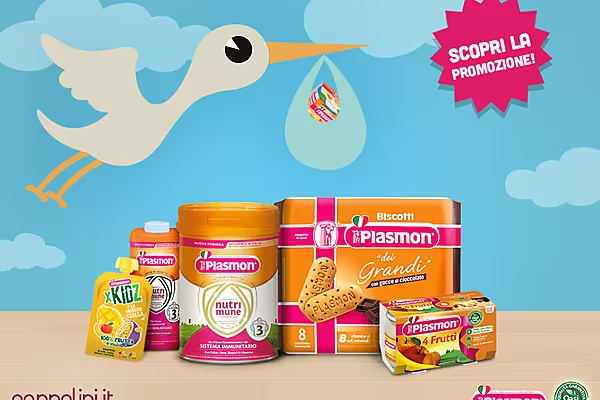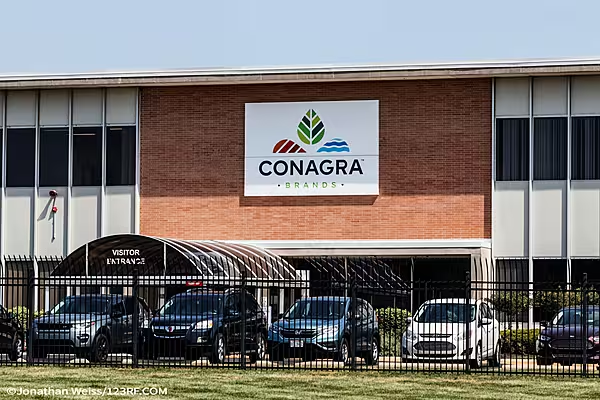Ciaran Sweeney, managing director of Fyffes Ireland, tells Maev Martin about how Fyffes is leading the industry drive towards more sustainable fruit production.
Ciaran Sweeney began working with Fyffes as a graduate management trainee.
Since then, he has held several positions in the company over the past 14 years, including general manager, before being appointed managing director this year.
“I’ve been fortunate to build my career with Fyffes, starting on the graduate trainee programme over 14 years ago,” he says.
“Growing up on a tillage farm in Co Louth gave me a strong foundation in agriculture, supply chain, decision-making, problem-solving, and practical common sense — all invaluable as I stepped into the fresh produce industry.”
According to Ciaran, the trainee management programme allowed him to further develop these skills and gain an in-depth understanding of Fyffes operations across Central America and Europe, with experience working in Costa Rica, Belize, Panama, the UK, and Ireland.
“As I progressed through roles, I gained valuable experience across a multitude of areas, including operations, supply chain management, marketing, sales and business strategy,” he says.
“My time as general manager gave me an in-depth view of the business, where I had the opportunity to shape our local strategy while aligning it with Fyffes’ global goals.
“Being appointed managing director this year has been both an honour and a testament to our company’s commitment to talent development.
“I’m excited to lead Fyffes in Ireland during this period of transformation and innovation.”
Fyffes Ireland has a strong business legacy in Ireland and currently employs 100 people.
“Fyffes has been at the heart of Ireland’s food industry for over 130 years, and that legacy is something we are incredibly proud of,” says Ciaran.
“From importing the first bananas into Ireland to becoming a trusted household name, there have been several significant milestones in our trading history.”
A major, and recent, milestone was the opening of its state-of-the-art banana ripening facility in Courtlough, just outside Balbriggan, in 2022.
“This facility represents our commitment to innovation and to maintaining the highest standards in fruit quality for our customers,” he says.
“The investment also supports our sustainability goals, as it allows for greater energy efficiency and reduces our carbon footprint.
“It is also key to ensuring that we meet growing consumer demand and maintain our leadership in the fresh produce market.”
ESG Principles
Ciaran considered several ESG (Environmental, Social and Governance) initiatives during the construction of the new premises in Balbriggan, many of which were eventually implemented throughout the company.
“When we designed the new facility in Balbriggan, ESG principles were integral to our planning,” he says.
“The focus was on creating energy efficiencies and reducing our environmental impact.
“We did this by powering the entire facility with 100% renewable energy, incorporating geothermal heating and PV panels, and implementing advanced ripening technologies that reduce energy consumption.”
None of Fyffes’ waste goes to landfill, and surplus food is donated to FoodCloud, resulting in over 100,000 meals being redistributed to their network of over 600 charities nationwide.
“Beyond environmental efforts, all our employees are trained on gender equality and human rights, and we ensure a safe, inclusive work environment, embedding ESG values across all our operations,” he says.
Community Engagement
Fyffes has introduced several community initiatives in recent years to better engage with its customers and potential customers, including the Fyffes Fit Squad and Ireland's Fittest School Competition.
“Engaging with the communities in which we live, and work, is at the core of our ethos, and we’ve launched several initiatives to promote health and wellbeing across Ireland,” he says.
“The Fyffes Fit Squad and Ireland’s Fittest School are good examples — they are interactive programmes that engage primary schools nationwide to educate children about the importance of physical fitness and healthy eating.
“The initiative has been incredibly well-received, helping us reach thousands of school children.”
Fyffes also regularly collaborates with sports clubs, local schools, and charitable organisations to help fund initiatives that have a direct impact on communities.
Ciaran believes consumers care about the impact their choices have on the farmers and communities that are responsible for the fresh produce they buy.
“Many of the bananas we sell in Ireland come from Belize where we have invested extensively in community programmes,” he says.
“We are committed to improving childhood nutrition.
“Near our own farms in Belize, we have refurbished school kitchens in local primary schools where our surplus bananas are converted into a banana flour to provide breakfast to children on the government’s school-feeding programme.
“We have also built and refurbished medical clinics and primary schools, and we invest in climate resilience programmes.”
Business Transformation
Globally, Fyffes employs 14,700 people, has offices in 12 countries, and has embarked on a major business transformation programme that includes investment in new facilities and infrastructure upgrades.
“Fyffes global business transformation programme is part of our long-term strategy to future-proof our operations, ensuring efficiency, sustainability, and the ability to meet changing market demands,” says Ciaran.
“The programme is phased and will run over the next several years, with some key projects already underway.
“The thinking behind this transformation is to modernise our infrastructure so that we can continue to lead in terms of quality, sustainability, and operational excellence.
“We will continue to invest in energy-efficient technologies, improved logistics and supply chain processes, and a stronger digital framework to better manage our global operations.”
‘Shaping Wellbeing for the World’
According to Ciaran, sustainability is at the core of how Fyffes runs its business in Ireland and how it produces its products for consumers.
“At Fyffes, our vision is ‘Shaping Wellbeing for the World,’” he says.
“To make this a reality, we must lead in human rights and environmental due diligence in the fresh produce sector and beyond.
“Sustainability is central to everything we do.
“From sourcing to production and distribution, we strive to operate in a way that minimises our environmental impact and maximises social and economic benefits for the communities we work with.
“We recognise that consumers are increasingly making environmentally conscious choices, and we are committed to ensuring our products are sustainably sourced and responsibly delivered.”
Sustainable Production
Leading the food industry forward and towards the production of more sustainable fruit is a major focus for Fyffes.
“Fyffes is at the forefront of sustainable fruit production, emphasising practices that reduce environmental impact, such as minimising pesticide use, enhancing water management, and protecting biodiversity in our sourcing regions,” says Ciaran.
“We are also collaborating with research institutes, local governments, and other organisations to jointly develop and implement innovative projects.
“Through these partnerships and sectoral initiatives, we aim to drive progress across the industry, advancing sustainable practices that benefit not only Fyffes but the wider food production community.”
Ciaran has a great deal of sustainable farming experience from his time working in the Tropics and these learnings have influenced his work in Fyffes.
“During my time in the Tropics, I saw first-hand the importance of biodiversity, water conservation, and soil health in maintaining long-term crop productivity,” he says.
“We have integrated practices such as organic fertilisation, soil conservation, and natural pest control into our farming practices.
“Sustainability is not just about the environment but also about supporting the local communities with whom we work, ensuring fair labour practices, and creating a positive impact in the regions where we operate.”
Regenerative Agriculture
I asked Ciaran about how far advanced Ireland is along the road to regenerative agricultural practices.
“Ireland is already leading the way in sustainable agriculture,” he says.
“This is thanks to our livestock’s grass-based diet, high food safety standards, and one of the world’s lowest carbon footprints for grain production.
“To further strengthen this leadership, we need more support through public-private collaboration, research, and targeted incentives that build on our unique environmental conditions.
“The increasing risks of climate volatility and price fluctuations also highlight the need for an income insurance scheme, like the scheme that is in operation in the US, to provide farmers with stability.
“With growing consumer demand for sustainable food, Ireland is well-positioned to set the standard for a resilient, future-focused food system.”
Read More: Bewley’s Leads Global Coffee Innovation
